-
ORIGINAL ARTICLE07-29-2024
Contribution of informal caregivers to self-care in individuals with heart failure
Revista Brasileira de Enfermagem. 2024;77(3):e20230492
Abstract
ORIGINAL ARTICLEContribution of informal caregivers to self-care in individuals with heart failure
Revista Brasileira de Enfermagem. 2024;77(3):e20230492
DOI 10.1590/0034-7167-2023-0492
Views0See moreABSTRACT
Objectives:
to evaluate the contribution of informal caregivers to the self-care of individuals with heart failure.
Methods:
a cross-sectional study was conducted with 87 caregivers from March to October 2022 in the city of João Pessoa/PB. The caregivers’ contribution was assessed using the Caregiver Contribution to Self-Care of Heart Failure Index instrument. Scores ≥ 70 points indicate adequate contribution. Data were analyzed using descriptive statistics and Spearman’s correlation.
Results:
the sample consisted of 81.6% female caregivers. Median scores obtained for the self-care contribution scales were: 63.3 for maintenance; 55.5 for management; and 66.6 for confidence. Caregivers never or rarely recommended monitoring body weight, regular physical exercise, extra use of diuretics, and fluid restriction.
Conclusions:
informal caregivers showed inadequate contribution in the areas of maintenance, management, and confidence in self-care of individuals with heart failure.
-
07-29-2024
Reflections on theoretical framework use in nursing research
Revista Brasileira de Enfermagem. 2024;77(3):e20230486
Abstract
Reflections on theoretical framework use in nursing research
Revista Brasileira de Enfermagem. 2024;77(3):e20230486
DOI 10.1590/0034-7167-2024-0486
Views0See moreABSTRACT
Objectives:
to reflect on theoretical framework use in nursing research.
Methods:
a theoretical-reflexive study, based on concepts and constructs pertinent to using nursing theories and other sciences, considering issues of epistemology or philosophy of science.
Results:
we presented what it is and why to do nursing research and what a theoretical framework is and why to use it, in addition to some considerations regarding theoretical framework use in nursing research, essential for constructing disciplinary knowledge, which enables the materialization of researchers’ work and the presentation of propositions resulting from investigations in and for nursing as a discipline and science.
Final Considerations:
based on a reflection based on epistemological conceptions, it is possible to affirm that a theoretical framework is the core of researchers’ thinking, delimiting a problem to be investigated and, based on it, outlining methodological strategies to be followed, supporting nursing action and thinking as discipline and science.

-
REVIEW07-29-2024
Nursing diagnoses for people hospitalized with heart failure: an integrative review
Revista Brasileira de Enfermagem. 2024;77(3):e20230471
Abstract
REVIEWNursing diagnoses for people hospitalized with heart failure: an integrative review
Revista Brasileira de Enfermagem. 2024;77(3):e20230471
DOI 10.1590/0034-7167-2023-0471
Views0See moreABSTRACT
Objectives:
to identify in the literature the main nursing diagnoses according to the NANDA-I diagnostic classification for people hospitalized with heart failure.
Methods:
an integrative literature review, carried out in February 2019 and updated in July 2023, in the MEDLINE via PubMed, LILACS, SciELO and CINAHL databases. Given the use of acronym PEO, studies without a time cut in Portuguese, English and Spanish were included. Descriptive analysis was carried out to present the identified information.
Results:
analysis of 27 articles identified 24 nursing diagnoses, with emphasis on Decreased Cardiac Output, Excessive Fluid Volume, Decreased Activity Tolerance and Fatigue.
Final Considerations:
evidence can contribute to better diagnostic decisions centered on people with heart failure in search of more assertive health results and have the potential to support future studies on a possible syndromic pattern in this population.

-
ORIGINAL ARTICLE07-29-2024
Primary Health Care in transitional care of people with stroke
Revista Brasileira de Enfermagem. 2024;77(3):e20230468
Abstract
ORIGINAL ARTICLEPrimary Health Care in transitional care of people with stroke
Revista Brasileira de Enfermagem. 2024;77(3):e20230468
DOI 10.1590/0034-7167-2024-0468
Views0See moreABSTRACT
Objectives:
to understand the role of Primary Health Care teams in caring for people with stroke after hospital discharge.
Methods:
single case study, with integrated units of analysis, with a qualitative approach. Data triangulation occurred through interviews with professionals and family caregivers involved in transition of care, in addition to direct observations in rounds and document analysis. For the analyses, the analytical strategies of theoretical propositions and construction of explanations were used, with the help of ATLAS.ti®.
Results:
the importance of counter-referral, the role of community health workers and the multidisciplinary team, health promotion, secondary prevention, home visits as a visceral attribute and nurses as care managers are evident.
Final Considerations:
the high demand on teams and the Social Determinants of Health interfere with adequate continuity of care. Transitional care programs that enable continuity of care are recommended.
-
ORIGINAL ARTICLE07-29-2024
Completeness of variables in Hospital-Based Cancer Registries for prostatic malignant neoplasm
Revista Brasileira de Enfermagem. 2024;77(3):e20230467
Abstract
ORIGINAL ARTICLECompleteness of variables in Hospital-Based Cancer Registries for prostatic malignant neoplasm
Revista Brasileira de Enfermagem. 2024;77(3):e20230467
DOI 10.1590/0034-7167-2023-0467
Views0See moreABSTRACT
Objectives:
to analyze the completeness of variables from Hospital-Based Cancer Registries of cases of prostate neoplasm in the Oncology Care Network of a Brazilian state between 2000 and 2020.
Methods:
an ecological time series study, based on secondary data on prostate cancer Hospital-Based Cancer Registries prostate. Data incompleteness was classified as excellent (<5%), good (between 5%-10%), fair (10%-20%), poor (20%-50%) and very poor (>50%), according to the percentage of lack of information.
Results:
there were 13,519 cases of prostate cancer in the Hospital-Based Cancer Registries analyzed. The variables “family history of cancer” (p<0.001), “alcoholism” (p<0.001), “smoking” (p<0.001), “TNM staging” (p<0.001) had a decreasing trend, while “clinical start of treatment” (p<0.001), “origin” (p=0.008) and “occupation” (p<0.001) indicated an increasing trend.
Conclusions:
most Hospital-Based Cancer Registries variables showed excellent completeness, but important variables had high percentages of incompleteness, such as TNM and clinical staging, in addition to alcoholism and smoking.
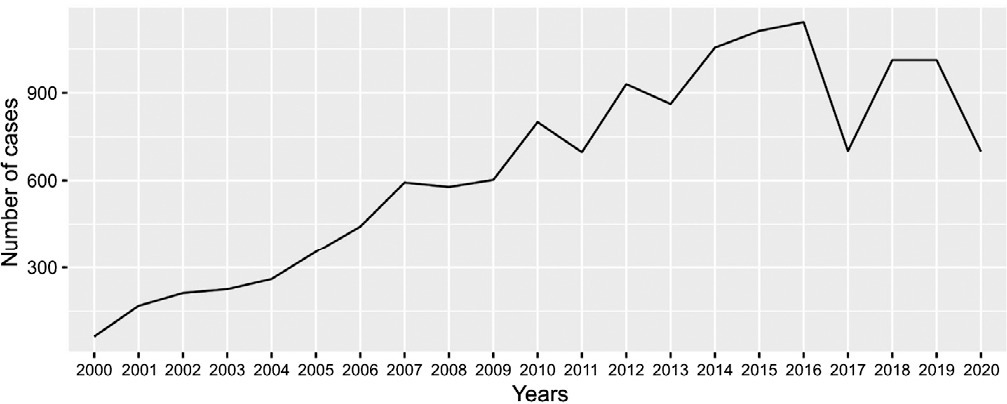
-
ORIGINAL ARTICLE07-29-2024
Disrupted mother-fetus dyad risk in high-risk pregnancies: a Middle-Range Theory
Revista Brasileira de Enfermagem. 2024;77(3):e20230464
Abstract
ORIGINAL ARTICLEDisrupted mother-fetus dyad risk in high-risk pregnancies: a Middle-Range Theory
Revista Brasileira de Enfermagem. 2024;77(3):e20230464
DOI 10.1590/0034-7167-2023-0464
Views0See moreABSTRACT
Objectives:
to develop and evaluate a Middle-Range Theory for the nursing diagnosis “Disrupted Mother-Fetus Dyad Risk” in high-risk pregnancies.
Methods:
this methodological study was conducted in two stages: theory development and evaluation. Dorothea Orem’s General Nursing Model was used as the theoretical-conceptual foundation. Evaluation was conducted using the Delphi method with seven judges, and consensus was achieved when the Content Validity Index of the evaluated items was ≥ 0.80.
Results:
the theory identified 20 elements of the nursing diagnosis “Disrupted Mother-Fetus Dyad Risk” (10 risk factors, 4 at-risk populations, and 6 associated conditions), 14 propositions, and 1 pictogram. After two rounds of evaluation, the theory was considered consistent, with consensus reached for all items, each achieving a Content Validity Index ≥ 0.80.
Conclusions:
the Middle-Range Theory included biopsychosocial factors explaining the nursing phenomenon “Disrupted Mother-Fetus Dyad Risk,” which aids in nurses’ diagnostic reasoning.
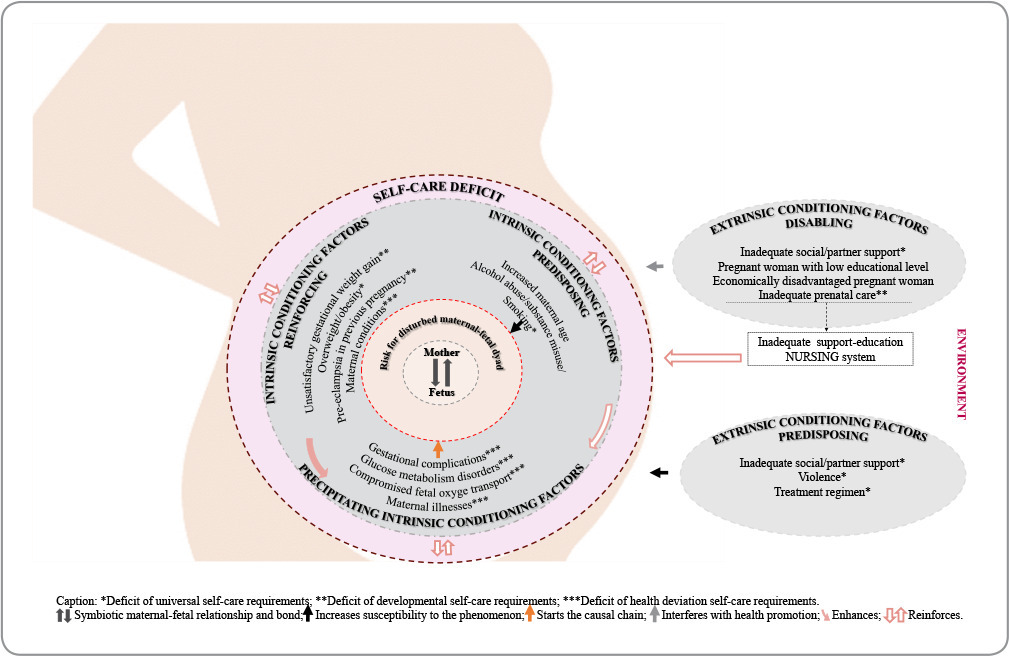
-
ORIGINAL ARTICLE07-29-2024
Mental health of parents of children and adolescents who require special health care
Revista Brasileira de Enfermagem. 2024;77(3):e20230457
Abstract
ORIGINAL ARTICLEMental health of parents of children and adolescents who require special health care
Revista Brasileira de Enfermagem. 2024;77(3):e20230457
DOI 10.1590/0034-7167-2023-0457
Views0See moreABSTRACT
Objective:
To identify the manifestations presented by parents of children and adolescents who require special health attention that can impact their mental health.
Methods:
exploratory, qualitative research, based on the concept of vulnerability, with data collection carried out through interviews with 18 parents of children and adolescents with special health care needs, hospitalized in the pediatric ward of a hospital in Paraná, between May/2017 and May/ 2018. Data analyzed by inductive thematic analysis.
Results:
parents experienced situations of vulnerability when providing care at home, with repercussions on their mental health, expressed by manifestations of lack of protection, anxiety and depression.
Final considerations:
It is important that health professionals seek to expand actions to promote care and reduce situations that generate threats, insecurities, concerns and damage to the health of parents, which can impact and further weaken care for children and adolescents who need attention especially health.
-
ORIGINAL ARTICLE07-29-2024
Evidence of validity of the Risk Self-Medication Questionnaire focused on Health Literacy
Revista Brasileira de Enfermagem. 2024;77(3):e20230386
Abstract
ORIGINAL ARTICLEEvidence of validity of the Risk Self-Medication Questionnaire focused on Health Literacy
Revista Brasileira de Enfermagem. 2024;77(3):e20230386
DOI 10.1590/0034-7167-2023-0386
Views0See moreABSTRACT
Objectives:
to analyze the validity evidence of the internal structure of the Risk Self-Medication Questionnaire Focused on Health Literacy.
Methods:
a psychometric study with 499 adults. The internal structure was assessed with exploratory and confirmatory factor analysis to prove the adjustment. Internal consistency was measured by composite reliability and McDonald’s omega coefficient (ω).
Results:
the parameters revealed a model of 35 items distributed across four factors, explaining 56% of the total variance, with factor loadings ranging from 0.31 to 0.85 and adequate communalities. Accuracy (0.79
Conclusions:
an instrument was obtained with good evidence of structural validity for measuring self-medication.
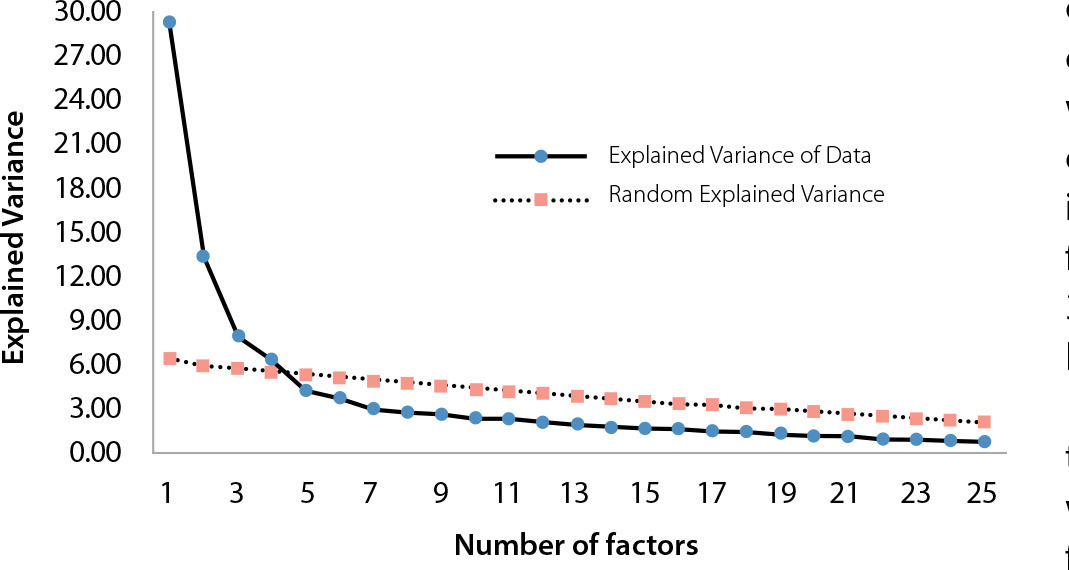
-
ORIGINAL ARTICLE12-04-2023
Burnout, ethical climate and work organization in covid-19 intensive care units: mixed method study
Revista Brasileira de Enfermagem. 2023;76:e20220684
Abstract
ORIGINAL ARTICLEBurnout, ethical climate and work organization in covid-19 intensive care units: mixed method study
Revista Brasileira de Enfermagem. 2023;76:e20220684
DOI 10.1590/0034-7167-2022-0684
Views0See moreABSTRACT
Objectives:
to analyze the association between burnout and the perception of the ethical climate in nursing professionals in the covid-19 Intensive Care Unit and the relationship with the organization of work from the perspective of managers of these units.
Methods:
mixed method study conducted in three university hospitals in southern Brazil from December 2021 to March 2022. A cross-sectional study was developed with 110 nursing professionals, followed by an exploratory-descriptive study through semi-structured interviews with six managers. Descriptive and analytical statistics and discursive textual analysis were used.
Results:
the prevalence of burnout was 10% and the perception of negative ethical climate was 24.5%. The association between burnout and ethical climate revealed overload and fatigue during working hours, related to tension, fear, and stress that emerged from the consequences of the organization and relations of work in the covid-19 Intensive Care Unit.
Conclusions:
there was an association between burnout and ethical climate and elements of the work organization.
-
ERRATUM02-26-2024
ERRATUM
Revista Brasileira de Enfermagem. 2024;77(1):e20160061
Abstract
ERRATUMERRATUM
Revista Brasileira de Enfermagem. 2024;77(1):e20160061
DOI 10.1590/0034-7167.20247701e03
Views2In the article “Nurses in the labor market: professional insertion, competencies and skills”, with DOI number: , published in Revista Brasileira de Enfermagem, 2017;70(6):1220-6, on page 1225:Include before REFERENCES:[…]See more -
ERRATUM06-14-2024
ERRATUM
Revista Brasileira de Enfermagem. 2024;77(2):e2024n2e06
Abstract
ERRATUMERRATUM
Revista Brasileira de Enfermagem. 2024;77(2):e2024n2e06
DOI 10.1590/0034-7167.20247702e06
Views2In the article “Is there scientific relevance to the plot of films and documentaries about eating disorders?”, with DOI number: , published in Revista Brasileira de Enfermagem, 2024;77(1):e20220547, page 7:Where it read:[…]See more -
ORIGINAL ARTICLE07-29-2024
Educational technology for multidisciplinary training for managing waiting lists for elective patients
Revista Brasileira de Enfermagem. 2024;77(3):e20230299
Abstract
ORIGINAL ARTICLEEducational technology for multidisciplinary training for managing waiting lists for elective patients
Revista Brasileira de Enfermagem. 2024;77(3):e20230299
DOI 10.1590/0034-7167-2023-0299
Views1See moreABSTRACT
Objectives:
to construct and assess an educational technology for managing patient waiting lists for multidisciplinary training.
Methods:
study supported by Instructional Design – ADDIE model, whose stages of construction of educational technology were developed in the form of a multi-professional training course. Its respective content assessment was carried out by a committee of experts from 2021 to 2022. The analysis occurred based on the proportion of content adequacy with 95% Confidence Interval.
Results:
seventeen products were created as educational technology learning objects: five storyboards; four videos; three comic books; two pedagogical action plans; a mind map; and a YouTube® playlist. Nine experts assessed content adequacy, which reached 0.89.
Conclusions:
this educational technology contributes to the performance of professionals who manage waiting lists by reducing inequalities, alleviating differences, in addition to promoting equity in care and good health for patients in the Brazilian Health System.

-
REVIEW11-22-2024
Spirituality and religiosity in children, adolescents and their families in a vulnerable context: a scoping review
Revista Brasileira de Enfermagem. 2024;77(5):e20230425
Abstract
REVIEWSpirituality and religiosity in children, adolescents and their families in a vulnerable context: a scoping review
Revista Brasileira de Enfermagem. 2024;77(5):e20230425
DOI 10.1590/0034-7167-2023-0425
Views1See moreABSTRACT
Objective:
to map evidence in the literature on the spirituality and religiosity of children, adolescents and their families in social vulnerability.
Methods:
this is a scoping review based on the JBI methodology, with the search without delimiting the time period, in English, Portuguese and Spanish, in the Virtual Health Library, PubMed, Embase, Cochrane Library, Scopus and Web of Science databases.
Results:
twenty-two studies were identified. The most studied population were adolescents, followed by children and their families. Regarding the setting, the context of vulnerability related to the low socioeconomic level experienced by these populations was highlighted. Furthermore, spirituality and religiosity were considered important for coping, social support, purpose and strength.
Conclusion:
there is an influence of spirituality and religiosity in the lives of children, adolescents and families, being a protective factor and a source of comfort, playing essential tools for living in context.

-
ORIGINAL ARTICLE12-13-2024
Stress in nursing workers caring for people with COVID-19
Revista Brasileira de Enfermagem. 2024;77(5):e20230542
Abstract
ORIGINAL ARTICLEStress in nursing workers caring for people with COVID-19
Revista Brasileira de Enfermagem. 2024;77(5):e20230542
DOI 10.1590/0034-7167-2023-0542
Views1See moreABSTRACT
Objectives:
to analyze stress from the perspective of nursing workers caring for people with COVID-19 in a public hospital in the Recôncavo region of Bahia.
Methods:
this is an exploratory qualitative study, conducted through semi-structured interviews. The data were analyzed using word clouds, similarity trees, and content analysis.
Results:
nursing workers were exposed to stress while attending to patients with COVID-19. The reported stressors in the workplace included: work overload, lack of planning, speed in performing tasks, fatigue, lack of participation in decision-making, lack of support from management, technological changes, excessive responsibility without preparation, interpersonal conflicts, and professional undervaluation.
Conclusions:
exposure to these stressors leads to emotional exhaustion and demotivation, which were intensified during the COVID-19 pandemic.

-
ORIGINAL ARTICLE01-13-2024
Knowledge, Attitudes, and Practices of nurses regarding blood culture collection
Revista Brasileira de Enfermagem. 2024;77(6):e20230424
Abstract
ORIGINAL ARTICLEKnowledge, Attitudes, and Practices of nurses regarding blood culture collection
Revista Brasileira de Enfermagem. 2024;77(6):e20230424
DOI 10.1590/0034-7167-2023-0424
Views2See moreABSTRACT
Objectives:
to investigate the knowledge, attitudes, and practices of nurses regarding blood culture collection.
Methods:
a cross-sectional study was conducted in five Brazilian public hospitals with 112 nurses. Data were collected using an adapted questionnaire and analyzed through descriptive and inferential statistics.
Results:
nurses who did not consider themselves capable of collecting blood cultures had a 72% lower chance of performing the collection at the recommended site and an 83% lower chance of using the same needle for blood inoculation into the vials. Nurses working in the emergency department had a 75% lower chance of knowing the international benchmark for blood culture contamination rates, and those with less than 5 years in the position decreased their chance of accuracy in this matter by 79%.
Conclusions:
there are gaps in the knowledge, attitudes, and practices of nurses regarding blood culture collection. Standardization of the technique, periodic education, supervision and guidance of the collection team, and process auditing are recommended coping strategies.

-
ORIGINAL ARTICLE01-10-2024
Inventory of ethical problems in mobile pre-hospital care
Revista Brasileira de Enfermagem. 2024;77:e20230539
Abstract
ORIGINAL ARTICLEInventory of ethical problems in mobile pre-hospital care
Revista Brasileira de Enfermagem. 2024;77:e20230539
DOI 10.1590/0034-7167-2023-0539
Views1See moreABSTRACT
Objective:
to construct and validate the content of an inventory of ethical problems experienced by nurses in mobile pre-hospital care.
Method:
a psychometric approach study, developed with the following stages: (1) instrument construction through a theoretical matrix based on deliberative bioethics, scoping review and online qualitative research; (2) content validity by judges; (3) pre-testing with Mobile Emergency Care Service nurses in various Brazilian states. For content validity analysis, the Content Validity Ratio was calculated (CVR>0.45 for judges and CVR>0.35 for the target population).
Results:
the instrument had 44 items, distributed across four dimensions.
Final considerations:
the constructed instrument presented sources of evidence of content validity, providing good psychometric measurements and constituting a useful tool for nurses’ practice in the pre-hospital setting.

-
02-25-2022
The multidimensional model of hope as a recovery-focused practice in mental health nursing
Revista Brasileira de Enfermagem. 2022;75:e20210474
Abstract
The multidimensional model of hope as a recovery-focused practice in mental health nursing
Revista Brasileira de Enfermagem. 2022;75:e20210474
DOI 10.1590/0034-7167-2021-0474
Views0See moreABSTRACT
Objective:
To analyze the theoretical dimensions of hope as a recovery-oriented practice in mental health nursing.
Method:
This is a reflective and discursive study based on theoretical and experiential aspects of hope in the recovery process of people facing mental health disorders.
Results:
Maintaining hope in adverse situations, especially while facing mental suffering, requires skills to manage the factors that promote and inhibit hope. This balance can be tricky to reach without the presence of high-skilled professionals. The study presents the concept of hope-inspiring competence and its main dimensions. The nurse’s hope-inspiring competence is recognized as a crucial advanced practice that optimizes mental health by providing motivational resources. Final Considerations: Hope-inspiring competence should be a core principle for recovery-oriented mental health professionals. Despite this recognition, the promotion of hope in mental health nursing specialized practice lacks evidence and visibility.
-
ORIGINAL ARTICLE12-05-2019
Falls of elderly people living in rural areas: prevalence and associated factors
Revista Brasileira de Enfermagem. 2019;72:177-183
Abstract
ORIGINAL ARTICLEFalls of elderly people living in rural areas: prevalence and associated factors
Revista Brasileira de Enfermagem. 2019;72:177-183
DOI 10.1590/0034-7167-2018-0460
Views0See moreABSTRACT
Objective:
to identify the prevalence and factors associated with falls in the elderly population living in rural areas.
Method:
this is a cross-sectional study, carried out in 2014, with 820 older adults recorded in the Family Health Strategy (Estratégia Saúde da Família). The association between the reporting of falls in 12 months and their associated factors was verified by the Chi-square and Fischer’s exact tests and by multivariate logistic regression analysis.
Results:
the majority of the sample was female (56.1%), white (90.2%) and aged 60-69 years (54.9%). The prevalence of falls was 27.9%, and being female, hypertensive and diabetic was associated to falls.
Conclusion:
it is the responsibility of health professionals to have a closer look at the elderly who have these chronic diseases, especially within the scope of the Family Health Strategy, which works longitudinally with these patients, in addition to improving nursing care aimed at this population.
-
ORIGINAL ARTICLE09-21-2020
Family management ofchildren who experience sickle cell disease: a qualitative study
Revista Brasileira de Enfermagem. 2020;73:e20190521
Abstract
ORIGINAL ARTICLEFamily management ofchildren who experience sickle cell disease: a qualitative study
Revista Brasileira de Enfermagem. 2020;73:e20190521
DOI 10.1590/0034-7167-2019-0521
Views1See moreABSTRACT
Objective:
to know the family management experience of children with sickle cell disease in the light of the Family Management Style Framework.
Methods:
a qualitative case study carried out between September/2015 and July/2016 with 12 members of eight families registered in a blood center in Minas Gerais. The semi-structured interviews were recorded, and the data were analyzed and interpreted by the hybrid model thematic analysis.
Results:
three management styles were identified: five families in the accommodating style; two families in the struggling style; and only one family in the enduring style.It was noted that empowerment was paramount in the acquisition of skills and abilities to care for these children.
Final considerations:
family management knowledge of children with sickle cell disease provided a reflection on nurses’ role in supporting, orienting and encouraging the empowerment of these families aiming at the search for comprehensive care.
-
REVIEW09-21-2020
Postnatal care of newborns in the family context: an integrative review
Revista Brasileira de Enfermagem. 2020;73:e20190454
Abstract
REVIEWPostnatal care of newborns in the family context: an integrative review
Revista Brasileira de Enfermagem. 2020;73:e20190454
DOI 10.1590/0034-7167-2019-0454
Views0See moreABSTRACT
Objective:
to analyze the postnatal care practices of newborns in the family context from the scientific literature.
Methods:
the searches of the integrative literature review were carried out in the Latin American and Caribbean Literature in Health Sciences (LILACS), Nursing Database (BDENF), Scientific Electronic Library Online (SciELO), and U.S. National Library of Medicine (PubMed) databases.
Results:
sixteen studies composed the final sample and, from these, two analytical categories emerged: Practices and doubts of families in postnatal care of newborns; and Best practices in postnatal care of newborns.
Final considerations:
several cultural practices of families differ from scientific recommendations, which can generate risks to the health of newborns. Therefore, it is essential to consolidate educational programs with family members, to improve the quality of care offered and to reduce preventable neonatal deaths in different socio-family contexts.

-
ORIGINAL ARTICLE07-23-2021
Transition to exclusive palliative care for women with breast cancer
Revista Brasileira de Enfermagem. 2021;74(5):e20201325
Abstract
ORIGINAL ARTICLETransition to exclusive palliative care for women with breast cancer
Revista Brasileira de Enfermagem. 2021;74(5):e20201325
DOI 10.1590/0034-7167-2020-1325
Views0See moreABSTRACT
Objective:
to analyze the perspectives that affect the transition to exclusive palliative care for women with breast cancer.
Methods:
qualitative, descriptive study, carried out in a public health institution in Rio de Janeiro, Brazil, between December 2018 and May 2019. 28 health professionals were interviewed. Content analysis was used in the thematic modality.
Results:
the operational difficulties were linked to the fragmented physical structure, the late and unplanned nature of the referral, the ineffective communication, and the deficit of human resources. In general, women and family members resist referral because they do not know palliative care. There is no consensus among oncologists on the most appropriate time to stop systemic therapy for disease control.
Final considerations:
the perceived difficulties configure an abrupt referral, accompanied by false hopes and, often, limited to end-of-life care.
-
ORIGINAL ARTICLE07-22-2022
Effects of carbohydrate use on preoperative thirst: a randomized clinical trial
Revista Brasileira de Enfermagem. 2022;75(5):e20210355
Abstract
ORIGINAL ARTICLEEffects of carbohydrate use on preoperative thirst: a randomized clinical trial
Revista Brasileira de Enfermagem. 2022;75(5):e20210355
DOI 10.1590/0034-7167-2021-0355
Views0See moreABSTRACT
Objectives:
to evaluate the effectiveness of carbohydrate popsicles, carbohydrate solution, and usual care (fasting) on the intensity and discomfort of preoperative thirst.
Methods:
a randomized clinical trial with 60 preoperative patients aged between 18 and 60 years, randomized into three groups: control (fasting), carbohydrate solution (100 ml), and carbohydrate popsicle (100 ml). The outcomes were thirst intensity and discomfort.
Results:
there was a difference between groups for final thirst intensity (p = 0.01) and final thirst discomfort (p = 0.001). The effect size for both the Solution Group and the Popsicle Group was robust: 0.99 and 1.14, respectively.
Conclusions:
the groups that received the carbohydrate fasting abbreviation showed a reduction in thirst discomfort compared to the control group. The carbohydrate popsicle proved more effective in reducing the intensity of thirst. NCT: 3.209.283
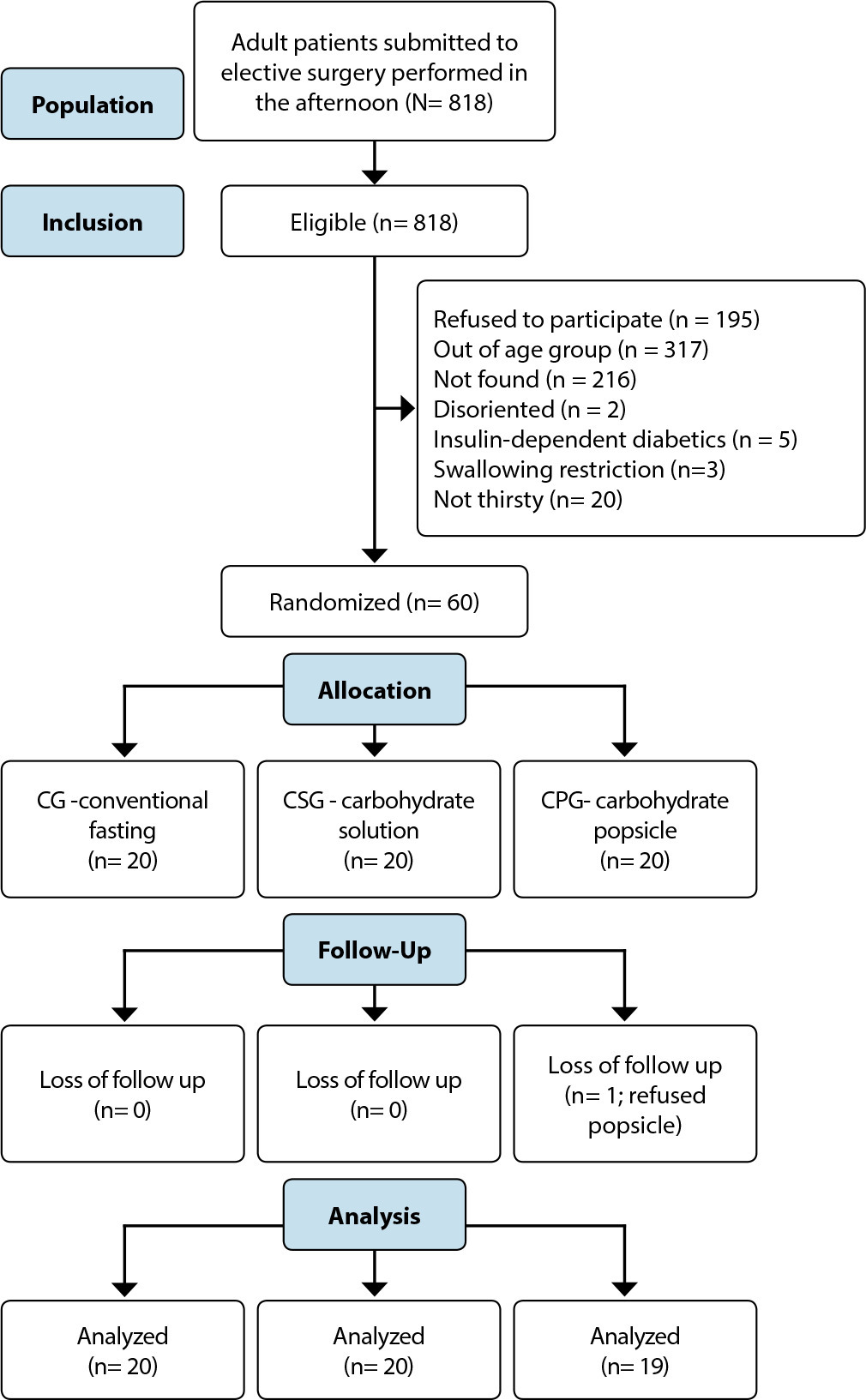
-
REVIEW07-29-2022
Technologies used by nursing to predict clinical deterioration in hospitalized adults: a scoping review
Revista Brasileira de Enfermagem. 2022;75(5):e20210570
Abstract
REVIEWTechnologies used by nursing to predict clinical deterioration in hospitalized adults: a scoping review
Revista Brasileira de Enfermagem. 2022;75(5):e20210570
DOI 10.1590/0034-7167-2021-0570
Views1See moreABSTRACT
Objective:
to map the early clinical deterioration technologies used in nurses’ professional practice in the care of hospitalized adult patients.
Methods:
this is a scoping review, according to Joanna Briggs Institute Reviewer’s Manual, which seeks to map the main technologies for detecting early clinical deterioration of hospitalized patients available for use by nurses, summarizing them and indicating gaps in knowledge to be investigated.
Results:
twenty-seven studies were found. The most present variables in the technologies were vital signs, urinary output, awareness and risk scales, clinical examination and nurses’ judgment. The main outcomes were activation of rapid response teams, death, cardiac arrest and admission to critical care units.
Final considerations:
the study emphasizes the most accurate variables in patient clinical assessment, so that indicative signs of potential severity can be prioritized to guide health conducts aiming to intervene early in the face of ongoing clinical deterioration.
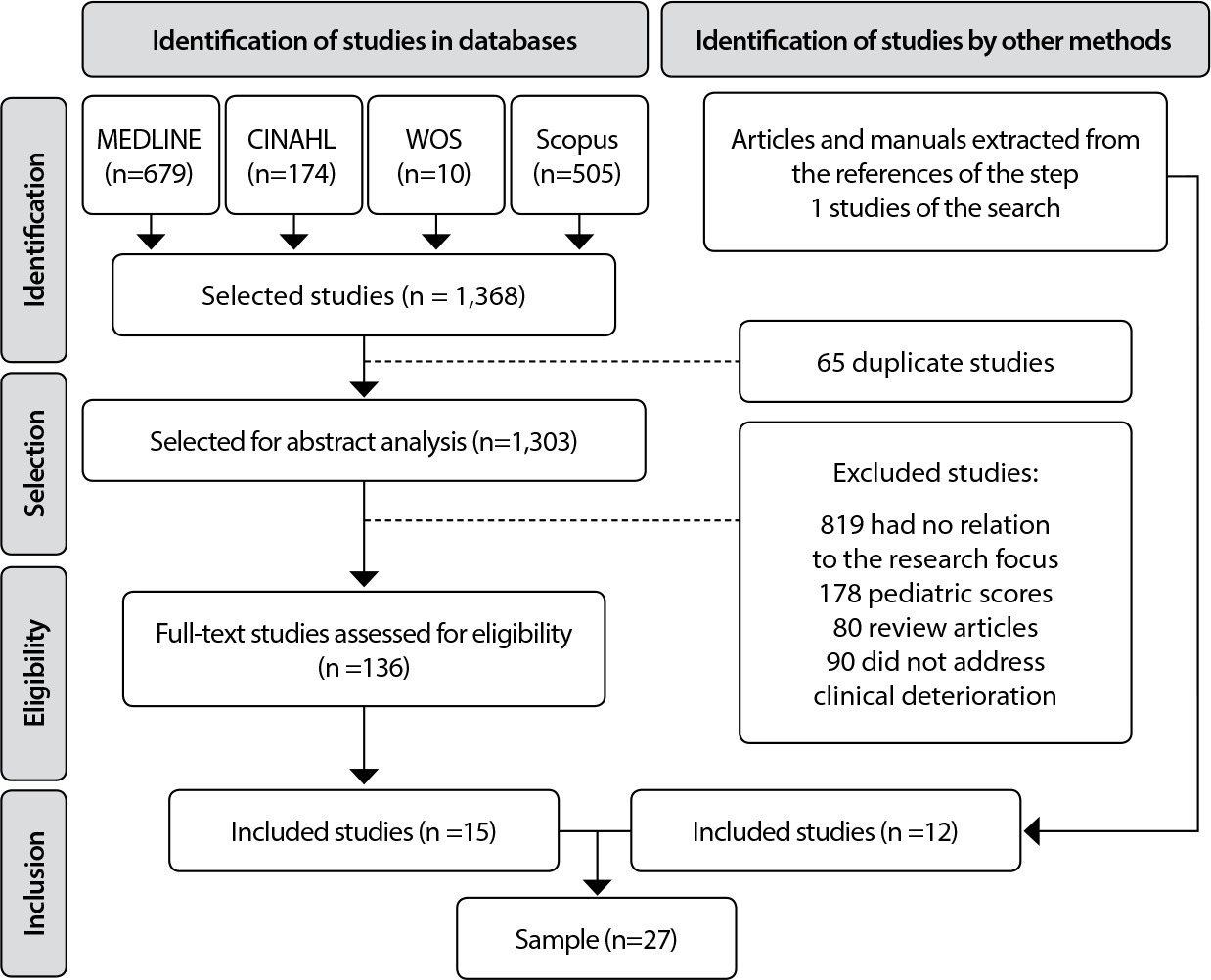
-
ORIGINAL ARTICLE12-13-2019
Effect of nursing telemonitoring on the knowledge of obese women: clinical trial
Revista Brasileira de Enfermagem. 2019;72:212-219
Abstract
ORIGINAL ARTICLEEffect of nursing telemonitoring on the knowledge of obese women: clinical trial
Revista Brasileira de Enfermagem. 2019;72:212-219
DOI 10.1590/0034-7167-2018-0500
Views0See moreABSTRACT
Objective:
To assess the effectiveness of remote monitoring in the knowledge of overweight women.
Method:
Randomized clinical trial with 101 women, randomly assigned to the control group (CG=50) and to the intervention group (IG=51). The IG received educational intervention over the telephone, during three months and routine follow-up in the service, while the CG only received conventional follow-up. The knowledge was assessed by a specific questionnaire. Data were analyzed by the Robust Linear Regression Model, adopting a statistical significance of 5%.
Results:
In the intragroup assessment, an increase in the correct answers with a statistically significant difference was observed only for the IG in the domains: “Concept and causes of overweight,” “Complications of overweight” and “Eating habits.” In the intergroup comparison, an increase in the average knowledge was verified in the same domains for the IG (p≤0.005).
Conclusion:
nursing telemonitoring contributed positively to the improvement of women’s knowledge.
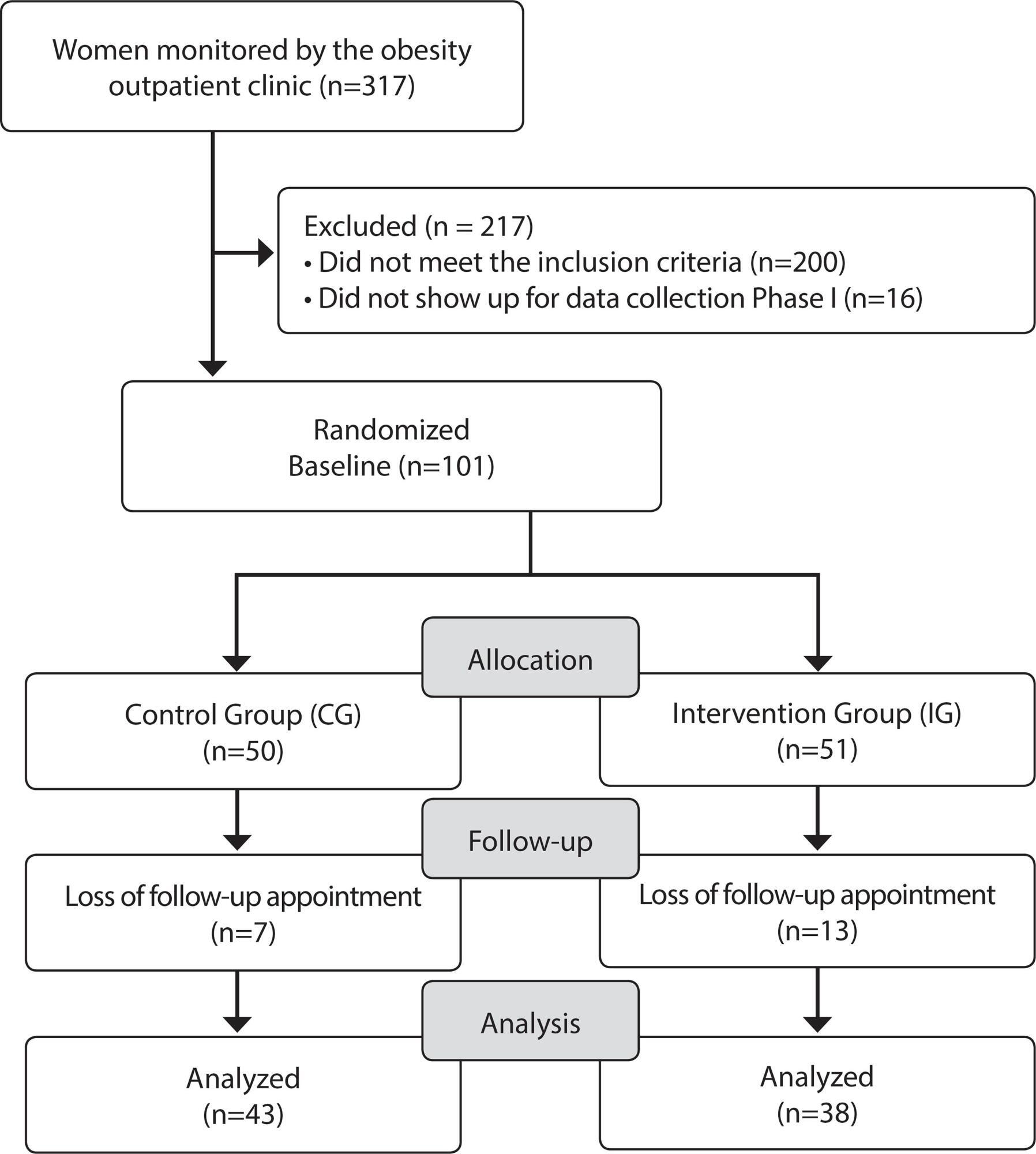
Search
Search in:
Nuvem de Tags
Adolescente (85) Atenção Primária à Saúde (239) COVID-19 (91) Criança (91) Cuidados de Enfermagem (269) Educação em Enfermagem (151) Educação em Saúde (139) Enfermagem (930) Enfermagem Pediátrica (86) Estudantes de Enfermagem (77) Estudos de Validação (131) Família (87) Idoso (208) Promoção da Saúde (99) Qualidade de Vida (104) Saúde do Trabalhador (86) Saúde Mental (145) Saúde Pública (82) Segurança do Paciente (150) Tecnologia Educacional (100)



